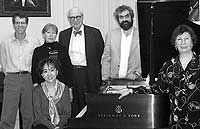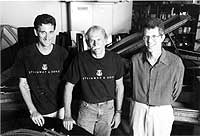Oberlin and
Steinway:
A 122-Year Partnership
by Michael Chipman '00

"It
is often interesting to imagine the initial meeting that
took place between Oberlin officials and Steinway &
Sons over 122 years ago.
Thanks to Oberlin's foresight, fostered by a strong belief
that the best deserve the best, this working partnership
was established. Steinway & Sons looks forward to
turning another century with our good friends at Oberlin."
WHEN SEVERAL OBERLIN PIANO FACULTY MEMBERS JOURNEYED LAST spring to the Steinway & Sons factory in Long Island City, New York, to see firsthand how the premier pianos are made, the visit marked yet another connection in a 122-year relationship. When the faculty, on that same visit, tested and purchased a new model D concert grand piano for Warner Concert Hall, the purchase brought the total number of Steinways at Oberlin, an all-Steinway school, to 196.
 |
|
Professors
Haewon Song, Sedmara Rustein, Piano Technician Allen
Wright, Professor Monique Duphil, Henry Z. Steinway,
Professor Michael Lynn at the Steinway factory in
Long Island City, NY.
|
"One of the things that attracts us to Steinway is that, like Steinway, we are in this for the long haul," says Michael Lynn, associate dean of technology and facilities at Oberlin. "We need a solid collection of pianos that we can rely on and use for a long, long, time. For 122 years Steinway has provided us with quality instruments. The relationship has been a successful formula. Also, the characteristics of the New York Steinway grand pianos have been a part of our institution for a long time and people are comfortable with that sound."
"According to our records," says Sally Coveleskie, director of institutional sales at Steinway & Sons, "the Oberlin College Conservatory has been an all-Steinway School since 1877. This is the longest relationship we have with any all-Steinway school, anywhere in the world, since our own company was founded in 1853."
"It is the 'singing' Steinway voice," says Ken Sloane, director of piano technology at Oberlin. "It sings and projects. The Steinway people say the tone must 'carry.'" Sloan is a widely recognized specialist in Steinway piano technology, having attended yearly training seminars even before he began his 21-year tenure at Oberlin in 1978.
Sloane says he has worked with other pianos and that he finds Steinways more "individualized" than others. "Steinway's manufacturing procedure (intentional to a degree) provides that the pianos are not created equally. Steinway contends they've never made a bad piano -- just different. I find them to be the most beautiful pianos. Some other pianos are made with exquisite attention to detail, but none of them have the Steinway voice."
Rutstein credits the human touch for the Steinway sound. "It was very impressive to visit the factory and to see that they build the pianos by hand," she says. "Even the body of the piano is made by hand. They take very thin layers of wood, glue them together, then wrap them around a frame to build the body. They have sound technicians who complete thorough work on every detail - the hammers, the keyboard -- real people examine every part."
 |
| The Paino Tech Team, left to right: Andrew Bertoni, Ken Sloane and Allen Wright. Photo by John Seyfried. |
She continues, "For my students, it is good to have the Steinway because the feeling of the keyboard is so good. When they leave, they will have the high standard of sound quality in their ear."
"I feel the Steinway is the most versatile piano," says Sloane. "It has the most dynamic range of sound that makes it suitable for all different kinds of music."
Sloane, who had classical training as a trombonist, says he and his staff of two other highly skilled piano technicians, Andrew Bertoni and Allen Wright, spend most of their time tuning and working with hammers. "If the piano is not in decline, we work with the tuning, the regulation (adjustment of moving parts so that they move in a predictable fashion), and voicing.
"Also critical to my role at Oberlin is the direction of our rebuilding program, unique in the musical academic world," says Sloane. "We rebuild 15 to 20 pianos a year. Most of the work is very thorough action rebuilding -- new felts and hammers and all new stuff in the action. Pianos in homes die of old age. Here they die of overuse. Some of our pianos are in use 16 hours a day, even more in some teachers' studios. Steinways really hold up well in heavy use situations. Even so, when we finish rebuilding a piano in Robertson there is always a feeding frenzy of students around it."
Lynn adds, "The students are the true beneficiaries of Oberlin's long-standing relationship with Steinway. They benefit because they practice on Steinway grands. Other schools have decided to buy less expensive pianos for their practice rooms, but we have fought to keep the Steinways here. That is something we will not compromise."
